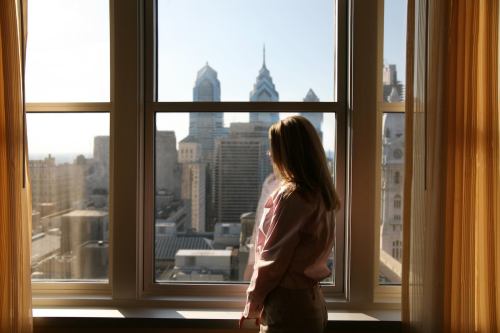Our editors independently select these products. Making a purchase through our links may earn Well+Good a commission
By scheduling time to do nothing every day for a week, I learned the secret to creativity
Next time you're thinking, "I'm bored," just remember—learning how to do nothing and practicing the skill is scientifically proven to help spark genius.

I recently fell down an internet rabbit hole that taught me the scintillating history of—I kid you not—boredom. I closed my laptop with a newfound appreciation for the family road trips of my childhood that, at the time, made me want to cry for the sheer purpose of having something to do. That’s because what I didn’t know then is that research suggests that those rare moments when we’re not preoccupied with our screens, caught in the riptide of our inner-monologues, or out to dinner with friends are undiscovered gold mines for creativity.
Tedium has existed throughout the course of human history, but not quite in the same way it does now: John Eastwood, PhD, of Toronto’s York University tells Smithsonian Magazine that the type of boredom the Kardashians must feel as directors shoot reel after reel of them lazing around on the couch, hashing out the minutiae of their lives (Kanye! Sushi! Pickles!) is relatively new. Over the last 100 years, humankind has gotten a taste of a new flavor of unbridled entertainment thanks to the likes of Netflix, Candy Crush Saga, and Pokémon Go. Now, any idle moment stands out in stark contrast. “We are very used to be passingly entertained,” Dr. Eastwood says. “We have changed our understanding of the human condition as one of a vessel that needs to be filled.” Essentially, we don’t know how to do nothing.
While I certainly plead guilty to this, all hope here isn’t lost for me or, really, any of us. We’re all perfectly capable of taking ourselves off autopilot and accessing our inner-brilliance. We just need to stop. reaching. for. stimulation. “We humans do our most original thinking and best problem-solving when our brains are allowed to wander,” Manoush Zomorodi, author of Bored and Brilliant who’s studied the emotional state in-depth, says on an episode of her podcast, Note to Self. “This high-level creative thinking takes place in what’s called ‘the default mode’ network of the brain. When it looks like we are doing nothing or spacing out, our brains are actually incredibly busy.” It’s true. Studies suggest that seemingly mindless moments, like walking sans-distraction (à la Steve Jobs), level up both productivity and creativity.
“We humans do our most original thinking and best problem solving when our brains are allowed to wander.” — Manoush Zomorodi, author of Bored and Brilliant
Long story short, I’m a changed woman now. The Kells of last week used to spend her elevator rides checking her Instagram, her 20-minute commute tearing through Stephen King books, and her five minutes before hot yoga class arranging—and re-arranging—the setup of her mat and props. But no longer. That’s because I scheduled time to be bored for a week straight and—quite frankly—my life has never been more delightful. I never once thought, “Gosh, I’m bored!” Instead, I learned a lesson in using my time with intentionality—and I sincerely hope it sticks even after I delete the “DO NOTHING” reminder from my Google Cal.
Here’s what it’s like to make time for monotony in your daily life and learn how to do nothing.

Monday
“No better day than a Monday to be bored!,” I think to myself as I lock the door of my apartment behind me and head out on a walk, with my phone, computer, AirPods, and other digital-age paraphernalia left behind in my room. Without them, I feel like Annie from TheParentTrap, butt-naked after Hallie makes off with her clothes.
It’s early in the morning, and New York City’s streets are gloriously empty and quiet. Without music blasting in my ears, I’m able hear my super hum as he splashes water from a hose over the sidewalk pavement. It’s such a little thing, but it makes me smile.
I spend the rest of my walk trying to notice new things about my neighborhood. I guess that’s not “doing nothing” exactly, but by the time I get home, I feel a bit calmer. While I’m not ready to make like Cheryl Strayed and pen a prolific memoir about my awakening, I do find myself more excited than usual to head to work to do the whole “journalism” thing.
Tuesday
Today I schedule time to be bored while I’m in the Well+Good office, which feels—and I’m not being dramatic—like I’m suddenly a cheetah trying to grow stripes. Everyone around me is just tap, tap, tapping away at their keyboards as I excuse myself to go stare at a wall in the conference room.
At first, I truly am bored. My mind stresses about everything I have left to do. I think about eating a snack, and I remember that I still haven’t applied for a new driver’s license. Really, my “nothing” time becomes more like scheduled time to worry. I don’t feel creative, but the time away from my desk does reboot my mind and help me power through the rest of the day.
Wednesday
Since staring at the wall made my boredom time extra uneventful yesterday, I decide to go stare into space in a prettier location. Once again, I leave my worldly possessions behind and go to the nearby Union Square Park. Then, I stare at the blades of grass and not much else.
Because I’m already feeling zany for doing something as societally unacceptable as nothing, I start to close one eye, then the other, as I look at the grass. It’s trippy, but suddenly, an epiphany! Earlier that day, I’d couldn’t think of an introduction for an assignment, and then, bam, the solution suddenly pops into my head. I run up to the office to write it down before I forget.
Thursday and Friday
Because the week so far has taught me that nature + boredom = genius, I decide to start both of these mornings with a 6:30 a.m. jaunt to Central Park, which isn’t far from my apartment. Once I get there, I stare at the Reservoir, two trees leaning toward one another, and the sun seeping the skyline.
When I’m satisfied with my amount of nothingness committed on each day, I sit at a bench and take out my journal. I write down the phrases that bubbled up in my head during my morning walk: I note that I’ve been feeling stressed—even though I’ve been totally unaware of it until this moment—and also an idea for a short story I’ve been working on in my free time, and finally a story to pitch at work later.
As I’m sitting just outside the park on the steps of the Metropolitan Museum of Art on Friday, a quote from Elizabeth Gilbert’s Big Magic suddenly pops into my head: “Be the weirdo who dares to enjoy.” When I read that passage for the first time in college, I’d memorized it because I felt an undercurrent of truth underpinning each word. Now, I know why. Intentional, planned boredom is a way of “daring to enjoy the world.” It’s not “nothingness.” On the contrary, there’s so much “somethingness” in letting go of distraction. I know, I know: It may sound like a message folded into a fortune cookie, but it’s absolutely true.
While knowing how to do nothing can be good, it’s best done in moderation. So if you’re feeling fatigued from your workouts, here’s how to make them feel new again. Plus, here’s the hairstyle that makes for an instant glow-up.









